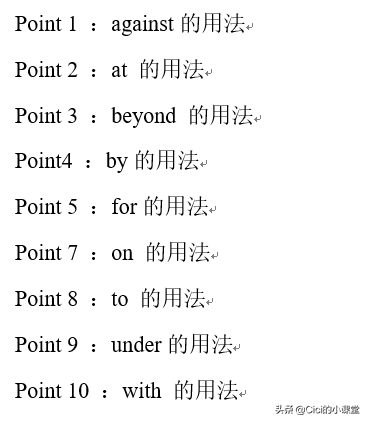Point 1 :against的用法
1. 与...竞争,对阵
He was injured in the game against the Lions. 他在与雄狮队的比赛中受伤了。
2. 触;碰;撞;紧靠;倚靠
Tired, Jim was fast asleep with his back against a big tree. 吉姆累了,背靠一棵大树很快睡着了。
3. 反对,违背,与...相反
He did it against his own will. 他的所作所为违背了他自己的意愿。
4. 防备,抵御
They took measures against the fire. 他们采取了防火措施。
5. 以...为背景,衬托
The hill looks more beautiful against the blue sky. 在蓝天的映衬下,山峰显得更加美丽。
Point 2 :at 的用法
1.用在表示地点,场合,方位等的名词前,表示“在某处”
I’ll pick you up at the airport at 2 o’clock this afternoon. 今天下午两点我会到机场接你。
2.用在表示时刻,钟点,期间,...岁,时节等的名词前。
He left school at (the age of) 16. 他16岁就离开了学校。
3.以,按(价格,速度,数量等)
He drove at twenty miles per hour. 他以每小时20英里的速度驾车行驶。
4.表示动作,情感的原因,意为“因...而;一听到/看到/想到...就...”
We were frightened at the terrible sight. 看到这可怕的景象,我们被吓到了。
5.朝、向、对着某人/某物的方向
He shot at the bird but missed it. 他朝那只鸟射击,但是没射中。
6.在(某方面)
She’s hopeless at managing people. 她对人事管理一窍不通。
Point 3 :beyond 的用法
1. (指程度)深于;(指范围)越出;(指可能性,理解力,能力等)非...可及
The book is beyond me. 这本书我不懂。
2. (指空间)在...的那一边;远于
The airport is 20 miles beyond the town. 机场在离城镇20英里的地方。
3. (时间)晚于,迟于
He came home beyond the usual time. 他比平时晚回家。
4. (指品质,习性等)处于...之外,超脱于
She has intelligence beyond the ordinary. 她聪明过人。
Point4 :by的用法
1.(时间)不迟于,在...之前
He is sure to come by three o’clock. 他三点之前肯定会来。
2.(位置)靠近,在...旁边/附近
On a cold evening, it is pleasant to sit by the fire. 在寒冷的夜晚坐在炉火旁边很舒服。
3.表示(标准、度量、数量)根据,按照,以...计算,常用结构为“by +the +单数可数名词”。
They sell eggs by the dozen. 他们按打卖鸡蛋。
We rent the car by the day. 我们按日租用汽车。
4.(表示程度、数量)相差
We lost the march by one goal. 我们以一分之差输了这场比赛。
5.经过,经由
They came in by the back door. 他们从后门进来的。
6.靠,用,通过(某种方式手段呢)
Are you to go there by bike or by bus? 你是骑车还是坐公交车去那儿?
Point 5 :for的用法
1. (表示目的)为了
China has been pushing the reform of public hospitals for the benefit of all its citizens.
为了使所有公民收益,中国一直在推进公立医院的改革。
2. (表示对象或用途)给,对
I’ve got a present for you.我有件礼物送给你。
The problem was that it was too valuable for everybody use. 问题是这对日常使用来说太贵了。
3. (表示原因)因为,由于
Campbell was arrested for dangerous driving. 坎贝尔因危险驾车而遭逮捕。
4. (表示时间,距离,数量)达...,计...
We drove for miles before we found a phone box. 我们开车数里才找到一个电话亭。
5. (表示等值或比例关系)换
He agreed to pay 300 dollars for the picture. 他答应付300美金买下那幅画。
6. 支持,赞成
How many people voted for the proposal? 有多少人赞成这个提议?
7. 至于,关于,就...而言
It’s cold for the time of year. 在一年的这个时节天气是冷了些。
8. (表示去向)往,向
A few days later she would be leaving for New York. 过几天她就要去纽约了。
9. (表示陈述或问题的对象)处于...
Doing exercise is good for our health. 锻炼对我们的健康有好处。
Point 6 :in的用法
1. (表示地点、场所、位置等)在...里面,在..内
The telephone was in the little study on the ground floor. 电话在一楼的小书房里。
2. (表示时间)在...期间,在(一段时间)以内;过...
It will be ready in a week’s time. 还需要一周时间就准备好了。
3. (表示某人或某物的状态、情况)处于...中
The house is in good repair. 这所房子维护的不错。
4. 在..上,在...方面
The foods that you buy in hamburger restaurants are high in fat, sugar and salt.
你在汉堡店买的食物所含的脂肪,糖和盐的成分都很高。
5. (表示服饰)穿着;戴着
He looked very handsome in his uniform. 他身着制服,看起来很英俊。
Point 7 :on 的用法
1.(表示接触或由某一表面支撑着)在...上
People were sunbathing on the grass. 人们在草地上沐浴阳光。
2.(表示时间)在...时候
All patients are examined on admission to the hospital. 所有病人入院时都要体检。
3.关于,有关
He will give a talk on the economic situation. 他将作关于经济形势的报告。
4.对着,朝
They are making an attack on the enemy. 他们向敌人发起攻击。
5.处于...情况中
He is still on leave. 他还在休假。
6.借助于...,通过...,以....方式
The information is available to the Internet. 从互联网上可以得到这个信息。
Point 8 :to 的用法
1. (表示方向,距离)到,向,去
It was on the way to the railway station. 那是在去火车站的路上。
2. (表示时间)知直到...为止,到
He wakes up at a quarter to six every morning. 他每天早上5点45分醒来。
3. (表示比较、比例、参照)与...相比,相对于...而言
I prefer oranges to apples. 我喜欢橘子胜过苹果。
4. (表示对象关系)属于,对,给
The hospital is attached to the university. 那家医院附属于该大学。
5. 达到(某一点或某个限度)
Temperatures dropped to 25 degrees below zero. 气温降到了零下25度。
Point 9 :under的用法
1.(表示位置)在...下面,在..之下
She placed the ladder under the window. 她把梯子放在窗户下面。
2.在...过程中
The possibility of employing more staff is still under discussion.
关于是否可以招聘更多员工的问题仍在讨论之中。
3.(数字、数量、年龄或价格)低于,少于,在...以下
These toys are not suitable for children under five. 这些玩具不适合五岁以下的儿童玩。
4.受..影响
She’s been under a lot of pressure at work. 她工作压力很大。
Point 10 :with 的用法
1. 和..一起,和,同,跟
Would you like to go shopping with me? 你愿意跟我一起购物吗?
2. (表示同时或同一方向)随着
With time going by, the little tree has grown up. 随着时间的流逝,那颗小树已经长大了。
3. 具有,带有
The dictionary is what I want, but I don’t have enough money with me.
这本字典正是我想要的,但是我没带够钱。
4. 由于,因为
He trembled with fear. 他吓得发抖。
5. (表示方式)用
He cut it with a knife. 他用刀把它切开。

